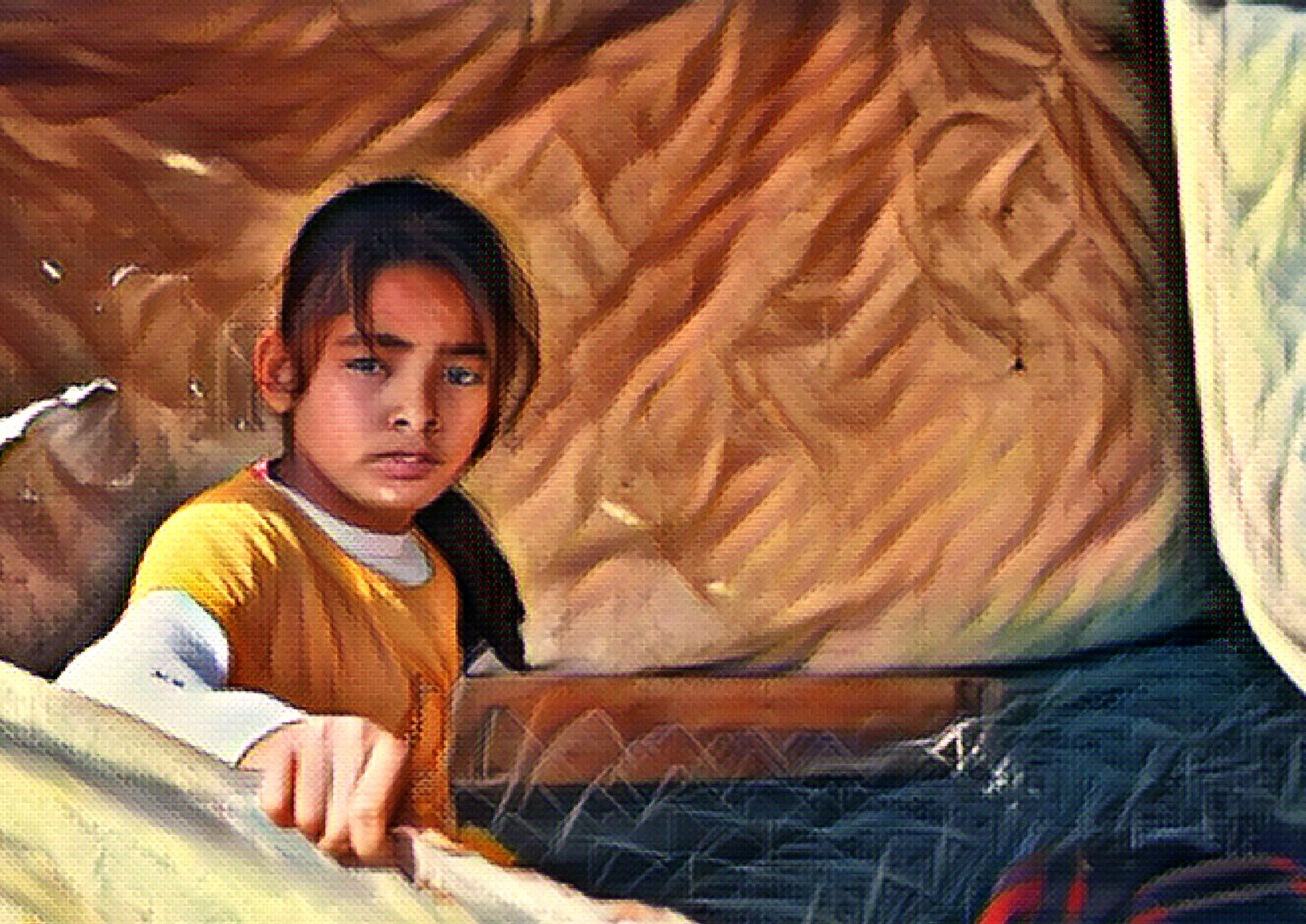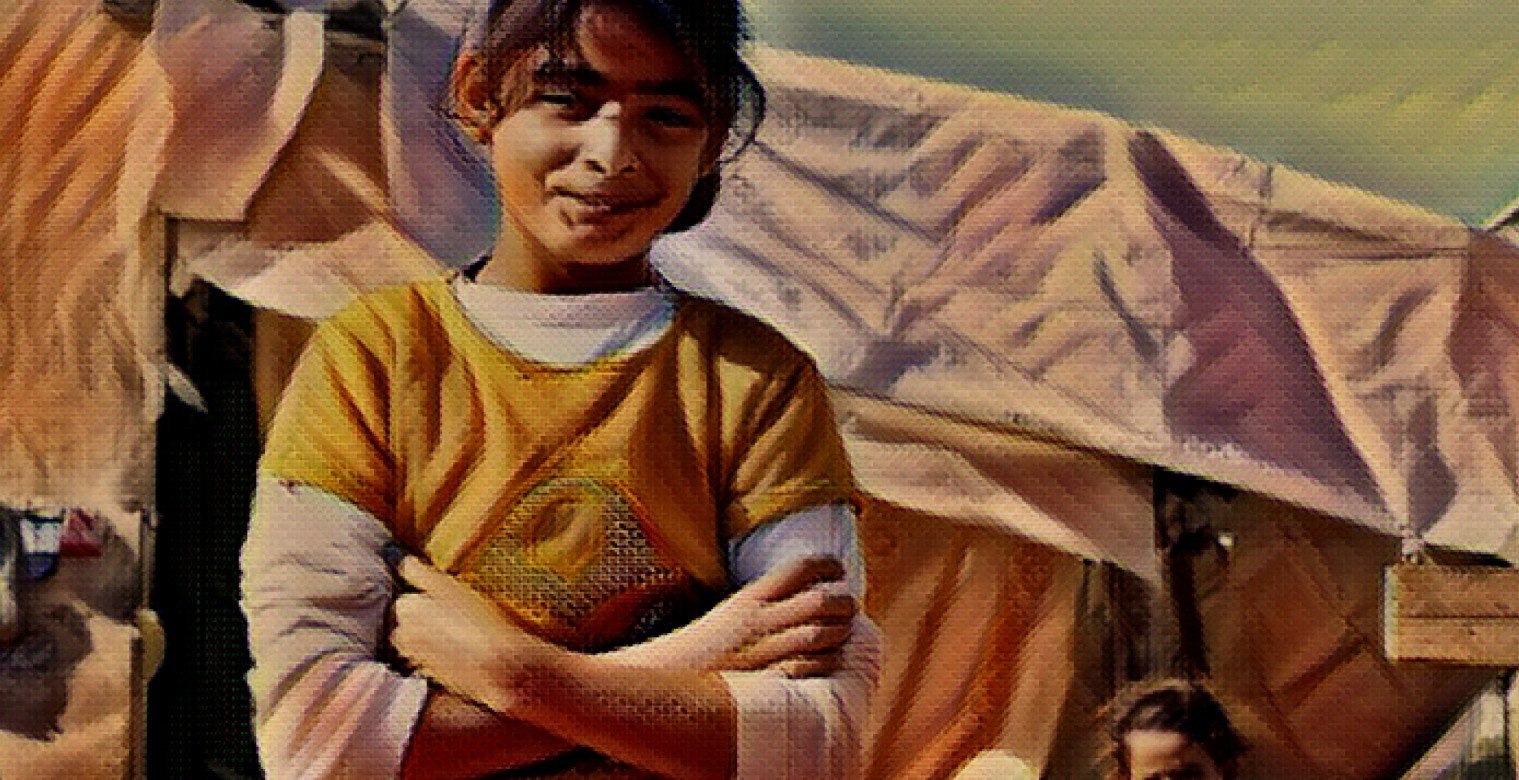Rahaf Jalal
An entire family has been sleeping on a mud land covered with obsolete rug based inside a nylon – wrapped tent for more than ten years. Nevertheless, family members didn't get accustomed to the harsh cold of December.
Amal "the eldest daughter in this family", peeks out over a tinplate wall with her head and yells out to her little siblings who are enjoying in the neighboring outdoor yard. "Come here. Come on, Mom has prepared the covers
to get warm " but nobody cares.
The mother lays down over a six meters long red rug which is connected to the entrance of the tent, similar as the one used for diplomatic protocols. It came as a coincidence. The mother who did not complete her secondary school used to provide her tent with all the aid and support she received to improve their living conditions that she lives in a tent which is half a kilometer away from the eastern border of the village of Al - Umar, central Gaza, with  Israel.
Israel.
As a part of luxury and decoration, the mother puts the pitchers and ornamental potted plants on rugs' both sides, and by hiding her laugh with her white shawl tip, she said: "I'm trying to make a beautiful tent in kids' eyes".
Dozens of wretched families often continue living in exile areas, either due to home destruction as a result of the ongoing wars on Gaza Strip, or because the lack of money. In either case, the tent is the shelter.
The deficit in living quarters has exceeded to 120 thousand unit in Gaza, as confirmed by under-secretary of the Ministry of Public Works and Housing in Gaza, Naji Sarhan.
Sarhan had indicated in a previous press release that the sector produced 12,000 housing units per year, but the recurrent wars have resulted about twofold increase in the deficit.
As the mother Sanaa (a pseudonym) says, we have no choice except living in this dwelling where we are facing a lack of privacy and independence, we were barely able to take an angle in this tent and turn it into a bathroom which is covered by a fabric piece on all sides.
in addition, the bathroom which is covered with a worn curtains consists of a squat toilet, tablet of soap, water jug, fiber loofah (bath sponge) and by its side there is a large plastic tub used to do laundry as the mother said.
Sanaa ,28 years old with her bashful cheeks, stands on the center of a frame of concrete sitting on columns, separated by wooden shelves and this is called the kitchen.
The available dishes on Sana's kitchen have multiple names for the same type of food, so Legumes are the main dish with different recipes, sometimes it's a lentil soup, other times it's made as a kofta and in some cases it called " damsah", etc.

In the midst of conversation about food in poor's dwellings, water has started to spill from the tent's ceiling and Sana went to look for a pot to collect water.
we stand away so she can take away the floor covers, then we suddenly asked " how could the children sleep here... this floor land will straightaway turn into mud when it rains.
She replied carelessly: "it's normal, it's always happening and all we can do is to put like these buckets on " even on sunny mornings, we put more of these nylon pieces on top to cover the gaps in the tent, there is no option except getting used to this condition ", she added.
Meanwhile, her eldest and youngest kids were having a quarrel over a cotton teddy bear, one of them has grabbed the stuffing cotton and it became worse that the little one kept crying. She said it's a routine during the day as there is nothing can distract them of that even study.
According to the study it was necessary to see Children's Mentality. especially according to this period, coinciding with the final exams in the first semester of the year 2021-2022. At that point, the tent turns into a classroom. She has one in primary school and the other in secondary school, they were preparing themselves for exams and she was clearly not satisfied with their educational attainment.

As a result, a touchy question had to be asked about the link between poverty and the increased number of family members, especially that she gave birth to seven children the tent is only 30 meters in size. She replied that She would have preferred birth control measures. However, her husband refuses the idea totally.
According to PCBS's recent figures, demographic projections show that the crude birth rate in Palestine has reached 29.5 births per 10000 of the population, in west bank it hits to 27.2 compared to Gaza strip which is 32.9.
based on a previous survey by Palestinian Central Bureau of Statistics, 13% of women in Palestine don't meet the family planning needs, as the Cluster Survey data 2019-2020 reported that the women between 15-49 years and who are Currently married or who have the ability to conceive, even if they're willing to have a pregnancy spacing or want to limit the number of children, it reached 12% of those who didn't use any way of birth control in Gaza.
Women in poor families are facing more burdens and loads, mainly that a large number of couples are unemployed. Additionally, Sanaa has been suffering in order to get the aid because of her husband's incapability to work. Besides, it's hard to the Relief center researchers to access into remote border areas; hence, she felt obligated about looking for help in different contacts and most often it’s just a broken promise.
The local statistic has provided a clear data of the unemployment increase in Gaza, which presents the rate of labour force participation in 2020 about 47% in Gaza and 26% in the west bank.
Turning back to Amal, the girl with a wheaten skin and a blonde hair who was standing in the aside, biting her nails then we asked her to bring her sketchbook and we didn't find even a painting could express a direct or clear concept for her feelings. From a personal perspective it was such a scribble, still it may have another explanation on the psychological level.
At last, we've asked Amal " What's Your Wish?" and she replied spontaneously: I wish I could have a home so we wouldn't be afraid from dogs at night also to have a warm bed, she added.



